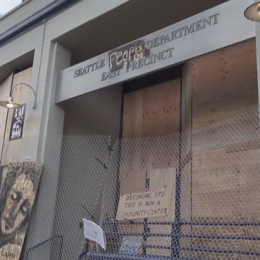America Is Not a Real Country
Posted By Winston E. Bakewell On In North American New Right | Comments Disabled2,220 words 
The term “failed state” conjures images in the mind’s eye of collapsed banana republics, exploding Islamic theocracies, and Somalia in general. It’s a condition that would be unthinkable in the West; the countries and nation-states that constituted a vast majority of the world’s white people have remained mostly in place for centuries in some cases, and recent examples of uncertainty were due to war or revolution — and these states were very quickly restored to some capacity after the dust settled.
The problem with the term failed state is that it implies some kind of implosion; a discernable line between a stable society and uncivilized anarchy has been crossed. A failed state does not have to collapse to have failed, though. A failed state can continue running, often in ways very destructive to its inhabitants, because it is continually letting them down by neglecting to perform the basic functions a serious government must.
The United States was, and remains, a radical experiment in the application of Enlightenment thinking. By most measures, the experiment was an astounding success. The United States rakes in dough, dominates global culture, and provides its citizens with a standard of living envied by global billions; billions whom we’ve started inviting in over the last 5 decades.
A failed state is generally defined [1] as a country that meets the following criteria:
- Loss of territory or the monopoly on the legitimate use of force
- Erosion of legitimate authority to make collective decisions
- Inability to interact with other states as a full member of the international community
- Inability to provide public services
A failed state can be difficult to spot with the naked eye, especially the naked eye of a Westerner who is confident that lawlessness inevitably is met with justice. It is in our nature to believe that something broken can be restored to former glory if we appeal to what we believe to be its ideal form in our policies, rhetoric, and actions. America broke at its seams on May 31st. These divisions cannot be mended without drastic changes to society. The conservative appeal to law and order would only be, at best, an attempt to turn back the clock. No matter how you look at it, something has gone terribly wrong.
The United States has failed.
Loss of territory or the monopoly on the legitimate use of force
Has the United States lost territory? From a reductive, borders-based standpoint, no. Culturally and politically? It would be foolish to say otherwise. The federal structure of the US entails some degree of autonomy among its constituent states, but certain provisions in the Constitution, especially those relating to the administration of law as it relates to foreign affairs, give the federal government jurisdiction over subnational bodies. These responsibilities include the enforcement of laws related to the movement of foreign nationals within the country, especially those seeking residence within the country. The federal government provides some level of enforcement of these laws along the border — the southern border in particular — but in recent years, has functionally lost nearly all of its enforcement power in major metropolitan areas. 11 states, and countless lower-level municipal and county jurisdictions [2], have legally declared that they will not cooperate with federal authorities in the enforcement of immigration law in the event they apprehend illegal aliens.

You can buy The World in Flames: The Shorter Writings of Francis Parker Yockey
This development is frequently harped upon by neoconservative types as being a mere power play against the Trump administration by Democratic mayors. That isn’t entirely incorrect. But it also misses a crucial point; these actions would not be power plays if they did not deprive the federal government of actual power, in sharp contrast to most of the symbolic gestures they offer to non-white communities in order to maintain peace and their voter base. The United States’ legitimacy rests upon subnational autonomy under the guidelines set forth by federal law and founding documents, but a wholesale rejection of national law — especially laws that compel subnational jurisdictions to act in the interests of the state — means that there exist multiple bodies throughout the country that enforce — or rather, do not enforce — varying interpretations of national legislation as they see fit. It’s also important to recognize that these individual legal bodies were not denied a say in the matter of national law, as all 11 of these sanctuary states have proportionate representation in both chambers of Congress.
Interstate cooperation on matters pertaining to local issues is an established practice in the US, and a useful feature of its republican system, since they can effectively address highly localized issues. An example that comes to mind is the collaboration between my home state of Oregon and Washington in hashing out the details of a new bridge over the Columbia River. This precedent, however, has not been constrained to specific debates over details regarding interstate issues. An entire so-called “Western States Pact [3]” has been brokered in order to tackle the (conveniently retconned [4], and then walked back [5]) COVID-19 pandemic, under the premise of the West Coast and closely-affiliated bodies having a better handle on the situation than the federal government. Fractured governmental responses are one of the first steps towards a Balkan reckoning.
The most recent mainstream discussion of the US being a failed state was actually related to the Wu-Flu Snafu, and it came from The Atlantic [6], arguing that the perceived lackadaisical response to the virus was the fault of sharp sociopolitical rifts and poor management by the Trump administration. I do not mean to defend this rhetoric, because it is a cheap attempt to attribute mass death a la genocide to the buffoonish Trump — despite actual deaths from the virus being very difficult to quantify [7] — but the very fact that discourse suggesting the President willfully slaughtered thousands en masse is being taken seriously by huge numbers of the population, and by entire state governments, is enough to indicate that federal grip on the country is functionally no more.
This is to say nothing of the many parts of the country where the majority of the population is not white [8].
Erosion of legitimate authority to make collective decisions
The Atlantic, of course, also generally misreads data and prescribes all manner of the same poisons that have placed in this situation to begin with. To them, the far-Right is on some kind of ascendency in the country. To vaguely “Right” mouthpieces, the opposite is true, and Trump is some kind of bulwark against a wave of foaming-at-the-mouth communists intent on taking over the nation (despite that, they’re still somehow winning) [9]. This is beyond mere polarization. It is implicitly believed, or at the very least, advertised, that the opposition to your dogma is the bloc that is hegemonic in the country. Leftists genuinely believe police departments and the federal government are run by literal Nazis. Tepid conservatives genuinely believe Antifa is a massive terrorist cell funded by any named boogeyman and that major corporations actually believe their woke capital bullshit.
In a country like this, it is impossible for useful decisions to be made or for any productive work to be done. Worse, however, is the fact the nation pretends that it can still continue to work.
Sometimes, the results are pretty funny.

Sometimes, they’re a little more exciting [10].

For the past several days, mass gatherings in American cities have become increasingly tolerated, either for the purpose of “deescalation,” as is the case in Seattle, or simply because there is no way to crack down on the events without such an amount of force that it’s likely citizens would end up dying — a major reputation concern. Multiple cities have banned the use of tear gas [11], though it is still being used [12] in these same jurisdictions to varying degrees, raising even more questions about just who is making decisions and who is going to follow those rules. Such a clean break between the words of a nominally-ruling government, its enforcement arms, and the few areas that have tenuously separated from the whole affair are a pretty solid indicator that nobody actually knows who is in charge. At best, control over American cities has become a kind of theater.
Even where some level of nominal decision-making can be observed, it must be noted that there’s little actual representation going on. Lobbying expenditures totaled 3.47 billion dollars [13] in 2019, and that’s just what we know about. The same companies dumping money into the halls of our legislative institutions are also endlessly signaling about their commitment [14] to sanitized, white-girl-on-social-media-friendly aims of the Black Lives Matter movement, as they know they stand to gain much more from feigned solidarity and continuing business as usual; business that we know is bad for the white majority [15], and is certainly bad for the aggressive non-white populations in the country as well. It just so happens that the latter are the only ones willing to take matters into their own hands at this point.
Inability to interact with other states as a full member of the international community
The United States has a twofold international relations problem. For one, its reputation abroad has sunk to incredible lows, either because of other nation’s endless criticism of how it has handled the viral pandemic — a sort of cheap shot, in some ways — or because of whatever Trump has done recently that is trendy to criticize.
Despite this, the United States remains the single-greatest “soft” power [16], and definitely one of the top military powers, in the entire world. The globe feasts on American culture. Riots sprung up in Europe over the death of a drug addict in Minneapolis. Nobody is interested in engaging with the United States as anything other than a giant playground to snag business deals and fads from. Even in the case of strong military power, no global “peacekeeping” mission that the US is engaging in serves the interests of its public — it would not be a stretch to call America a mere sponsor of the war industry, a bloated bureaucracy whose only function is to dole out contracts and pop culture.
Consider that the US is unable, for both political and image reasons, to use its massive military power to quell the popular wave of civil disobedience that has swept the entire country — yet it is fully capable of dispatching troops to far corners of the globe, in places where they are not wanted or even needed. The US military cannot fulfill the very basic role of providing national defense under the conditions and reciprocity of other foreign nations; instead, it throws its weight around in areas where some muscle is needed to meet the needs of interest groups evidently in charge of the nation.
As of right now, American citizens are not allowed to travel abroad to nearly every country on Earth, ostensibly because of the risk of spreading SARS Kapitel Zwei. Who is to say that such a thing will not last ad infinitum if the international community fears some kind of incident occurring from allowing American citizens in? Even if such fears are unfounded, or are even constructed by other nations, the fact remains that the US can and will be shut out from international bodies that it desperately needs to remain in for any shred of credibility. Lacking that, the US will have to resort to unilateral decision-making — something it is not unfamiliar with — rendering it a tantrum-throwing country without real sway over the world.
China seems poised to fill the vacuum once American money can be turned down.
Inability to provide public services
In the US, roads with potholes usually get fixed. You can count on having access to clean water, electricity, and emergency services. Things get done. Unless you live in a third-world hellhole, like Flint, Michigan, or apparently, Minneapolis, Minnesota. Perhaps worst of all, though is New Orleans; the crown jewel of Cajun culture, one of the few places in the United States that hosted a thriving black community — notably under the thumb of whites — that has since gone down a long, painful path towards complete ruination.
As our country’s demographics turn, things will no longer work right. “Karen” will have nobody to call. Our nation will cease to be a serious country in toto, and in some places, it’s stopped being a serious country a long time ago.
The New Orleans Hard Rock Hotel collapsed on October 12th [17] of last year, killing two workers. Unable to bury a dead body, but evidently able to cover it up, the city simply dropped a tarp over one man whose corpse remained trapped on a collapsed upper level, hoping to hide the fact that their incompetence has reached unprecedented heights.
That tarp blew away. People saw a dead man’s legs dangling [18] from the building. That man is still there. [19]
The United States is not a real country anymore. Take a good, long look at it.

What are we going to replace it with?
If you want to support our work, please send us a donation by going to our Entropy page [20] and selecting “send paid chat.” Entropy allows you to donate any amount from $3 and up. All comments will be read and discussed in the next episode of Counter-Currents Radio, which airs every Friday.
Don’t forget to sign up [21] for the twice-monthly email Counter-Currents Newsletter for exclusive content, offers, and news.